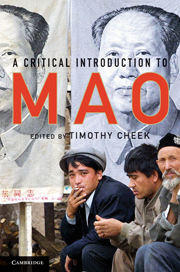Book contents
- Frontmatter
- Contents
- List of Illustrations
- About the Contributors
- Preface
- Acknowledgments
- Timeline of Twentieth-Century China
- Maps
- Part I Mao's World
- 1 Mao, Revolution, and Memory
- 2 Making Revolution in Twentieth-Century China
- 3 From Urban Radical to Rural Revolutionary: Mao From the 1920s to 1937
- 4 War, Cosmopolitanism, and Authority: Mao from 1937 to 1956
- 5 Consuming Fragments of Mao Zedong: The Chairman's Final Two Decades at the Helm
- 6 Mao and His Followers
- 7 Mao, Mao Zedong Thought, and Communist Intellectuals
- 8 Gendered Mao: Mao, Maoism, and Women
- 9 Mao the Man and Mao the Icon
- Part II Mao's Legacy
- Appendix: Selected Further Readings (Annotated)
- Index
- References
8 - Gendered Mao: Mao, Maoism, and Women
Published online by Cambridge University Press: 05 August 2012
- Frontmatter
- Contents
- List of Illustrations
- About the Contributors
- Preface
- Acknowledgments
- Timeline of Twentieth-Century China
- Maps
- Part I Mao's World
- 1 Mao, Revolution, and Memory
- 2 Making Revolution in Twentieth-Century China
- 3 From Urban Radical to Rural Revolutionary: Mao From the 1920s to 1937
- 4 War, Cosmopolitanism, and Authority: Mao from 1937 to 1956
- 5 Consuming Fragments of Mao Zedong: The Chairman's Final Two Decades at the Helm
- 6 Mao and His Followers
- 7 Mao, Mao Zedong Thought, and Communist Intellectuals
- 8 Gendered Mao: Mao, Maoism, and Women
- 9 Mao the Man and Mao the Icon
- Part II Mao's Legacy
- Appendix: Selected Further Readings (Annotated)
- Index
- References
Summary
The young Mao was a champion of women's rights. In early published essays, he attacked the arranged-marriage system and the way women were treated in the family. Later, in his reports on rural areas, he consistently gave attention to women's issues. The revolution that he led accepted the equality of the sexes as a major objective. Although it did not fully succeed in achieving even its own limited vision of equality, it did transform the roles of women in Chinese society. Yet Mao's treatment of the women in his own life did not reflect his ideals. The one thing that his wives had in common was that they suffered through their association with him. In old age, he indulged a lascivious fondness for pretty young nurses and assistants. This chapter explores Mao's attitudes toward gender as manifested in both his writings and his private life and will discuss how these relate to the achievements and deficiencies of Maoist gender policies.
WOMEN IN MAO'S THOUGHT AND WRITING
In his account of his childhood, Mao depicted himself as having been allied with his mother against his father. In hindsight, at least, he saw his father as an authoritarian tyrant and his mother and siblings as “the opposition.” When he was 14, Mao, by his own account, rejected the marriage arranged for him, demonstrating his opposition to the traditional marriage system for the first time.
- Type
- Chapter
- Information
- A Critical Introduction to Mao , pp. 196 - 218Publisher: Cambridge University PressPrint publication year: 2010
References
- 2
- Cited by

